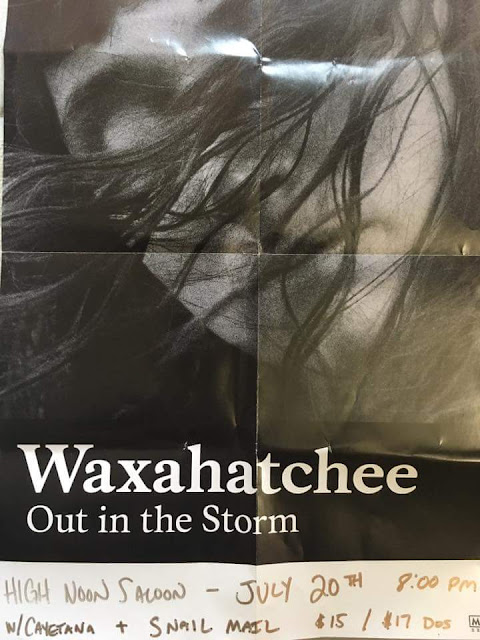In the midst of intense summer weather,
Waxahatchee brought their own storm to Madison Thursday night. Touring behind the stellar new album
Out in the Storm (released just a week earlier), bandleader
Katie Crutchfield delivered an unflinching 70-minute set of raw-nerve confessions to a sold out crowd at the
High Noon Saloon
While
Out in the Storm was born out of what Crutchfield refers to as "a fucked up relationship and intense breakup", she refuses to classify it as a breakup album. It instead turns its focus inward, with the storm in question being one of emotional turmoil. Crutchfield sneers (
Never Been Wrong,
No Question), seethes (
Hear You), and throws daggers (
Brass Beam) while simultaneously rising over it all (
8-Ball, A Little More). There is a stream-of-consciousness aspect to it on a song-by-song basis, as we hear her process all of it without ever attaching to any one thing in particular. The album is not about succumbing to the storm, but enduring it. It may be a surface-level downer, but the prevailing emotion is the empowerment and sense of potential that can only come after having weathered the storm, when all that's left is the truth.
In line with their subversion of the traditional breakup album is the professional approach Waxahatchee takes towards performance. If it wasn't clear by the arsenal of guitars on stage and a kick drum sporting their band name in an unassuming font that they meant business, it certainly was when the quintet entered wearing Reservoir Dogs-style suits and ties.
Waxahatchee opened their set with
Recite Remorse, one of the most understated and calm songs from the new album. Emphasizing the lines
"for a moment I was not lost/I was waiting for permission to take off", the song established an atmosphere of transition. Even as the energy ramped up with standout single
Silver, the band maintained it's deliberate yet restrained approach. Crutchfield led her bandmates as if she was fronting an army, stoic and strong, with minimal if any words between songs. They ran through nearly every song from
Out in the Storm, while interspersing revitalized takes on several older tracks. Katie's twin sister
Alison Crutchfield was key to the fullness of the sound as she provided vocal harmony while switching between guitar and keys. It was an almost orchestral delivery, as familiar standbys like
Poison and
The Dirt sounded vital and fresh and the new songs delivered on every bit of the urgency and passion of the record.
That isn't to say there weren't some emotionally charged moments. During the first chorus of
Never Been Wrong, when Crutchfield gazed out over the sellout crowd to snarl the lines
"Everyone will hear me complain/everyone will pity my pain" it was clear that for that moment, we were all part of her army. She seemed to let her guard down for the first time after bringing the band back out for the encore. After hardly saying anything during the set, she seemed genuinely excited and proud to introduce each band member. The encore itself carried a feeling of the storm having passed; consisting of the breezy
La Loose,
Out in the Storm-closing breather
Fade, and the unabashedly fun
Under a Rock.
 |
| Snail Mail |
Snail Mail, an upstart teenage band from Baltimore opened the show. They played about a half-hour set of lolling, understated songs that clearly emphasized the deceptively powerful vocals of
Lindsey Jordan. In a surprising move, the rest of the band exited the stage midway through the final song, allowing Jordan to deliver a solo performance of the emotional final verses. It didn't seem like they had established the momentum necessary for it to fulfill its intended impact, but was nonetheless the type of brave move that makes an opening band memorable on a crowded bill.
 |
| Cayetana |
Cayetana played next, delivering a set of tense, taught emo-ish pop-punk. It was the Philadelphia trio's first time playing in Wisconsin, and they expressed surprised admiration for its beauty as well as great interest in Mount Horeb's Mustard Museum. They showcased many songs from their new album, the self-released
New Kind of Normal. They leaned on amorphous tempos and some very cool early-Blink-esque bass guitar leads for a unique sound while maintaining a sense of genre familiarity.




























